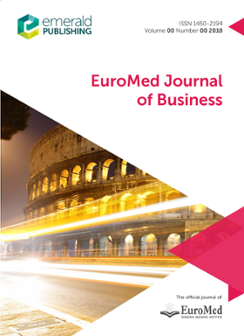石油价格波动与经济增长-银行部门关系:中东和北非国家的模型
IF 3.9
Q2 BUSINESS
引用次数: 0
摘要
本文的目的是实证评估石油价格波动对中东和北非石油进口国银行部门发展与经济增长之间关系的影响。设计/方法/方法本研究使用了新开发的面板自回归分布滞后(ARDL)方法,以解决研究变量之间潜在的内生性。研究结果表明,从长期来看,石油价格对石油进口国经济增长和银行业发展都存在单向因果关系。此外,银行业的发展不仅直接导致经济增长,而且可以在油价-经济增长关系中发挥调节作用。研究的局限性/意义这项研究有两个主要的局限性。一方面,这项研究是在相对有限的国家样本中进行的。另一方面,这项研究没有考虑银行业发展的其他指标和其他宏观经济变量。研究结果对银行管理者、监管机构和研究人员具有重要意义。银行管理者应该更加关注油价波动对银行发展的负面影响。监管当局必须强调进一步加强其银行部门的政策和战略,以减轻油价冲击对经济增长的负面影响。关注金融与增长关系的研究人员必须考虑油价冲击的潜在影响。原创性/价值已开发的概念模型可以检验油价波动可能在多大程度上影响经济增长与银行业发展之间的关系。在相关文献中,这种影响既没有得到评估,也没有得到澄清。本文章由计算机程序翻译,如有差异,请以英文原文为准。
Oil price fluctuations and economic growth–banking sector nexus: modeling for MENA countries
Purpose The aim of this paper is to evaluate empirically the impact of oil price fluctuations on the relationship between banking sector development and economic growth in oil-importing MENA countries. Design/methodology/approach The study used the newly developed panel autoregressive distributed lagged (ARDL) approach in order to address any potential endogeneity between research variables. Findings The empirical results show a unidirectional causality in the long run from oil price to both economic growth and banking sector development for oil-importing countries. Also, banking sector development not only leads directly to economic growth but also can play a moderator role in the oil price—economic growth nexus. Research limitations/implications The study has two principal limitations. On the one hand, this study was conducted in a relatively limited sample of countries. On the other hand, the study did not consider others indicators for banking sector development and others macroeconomic variables. Practical implications The results found have imperative implications for banks' managers, regulators and researchers. Bank managers should be more concerned with the negative repercussions of oil price fluctuations on the development of their banks. The regulatory authorities must emphasize policies and strategies to further strengthen their banking sector in order to alleviate the negative influence of oil price shocks on economic growth. Researchers focused on finance-growth nexus must take into account the potential influence of oil price shocks. Originality/value The developed conceptual model allows examining to what extent the oil price fluctuations might affect the relationship between economic growth and banking sector development. This effect is neither evaluated nor clarified in the relevant literature.
求助全文
通过发布文献求助,成功后即可免费获取论文全文。
去求助
来源期刊

EuroMed Journal of Business
BUSINESS-
CiteScore
9.80
自引率
19.20%
发文量
61
期刊介绍:
The EuroMed Journal of Business (EMJB) is the premier publication facilitating dialogue among researchers from Europe and the Mediterranean. It plays a vital role in generating and disseminating knowledge about various business environments and trends in this region. By offering an up-to-date overview of emerging business practices in specific countries, EMJB serves as a valuable resource for its readers.
As the official journal of the EuroMed Academy of Business, EMJB is committed to reflecting the economic growth seen in the European-Mediterranean region. It aims to be a focused and targeted business journal, highlighting environmental opportunities, threats, and marketplace developments in the area. Through its efforts, EMJB promotes collaboration and open dialogue among diverse research cultures and practices.
EMJB serves as a platform for debating and disseminating research findings, new research areas and techniques, conceptual developments, and practical applications across various business segments. It seeks to provide a forum for discussing new ideas in business, including theory, practice, and the issues that arise within the field.
 求助内容:
求助内容: 应助结果提醒方式:
应助结果提醒方式:


